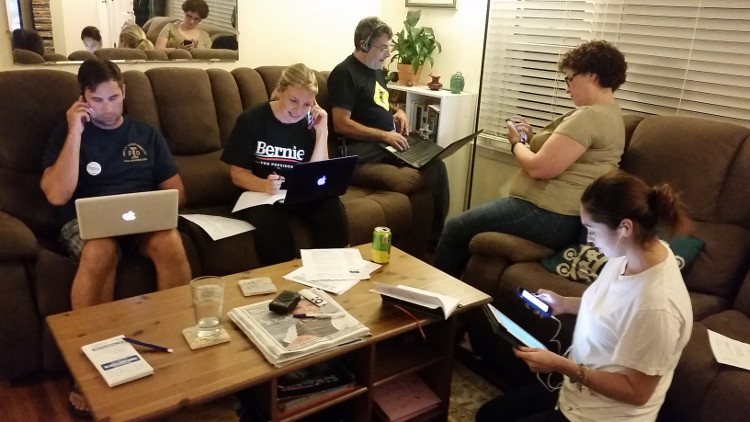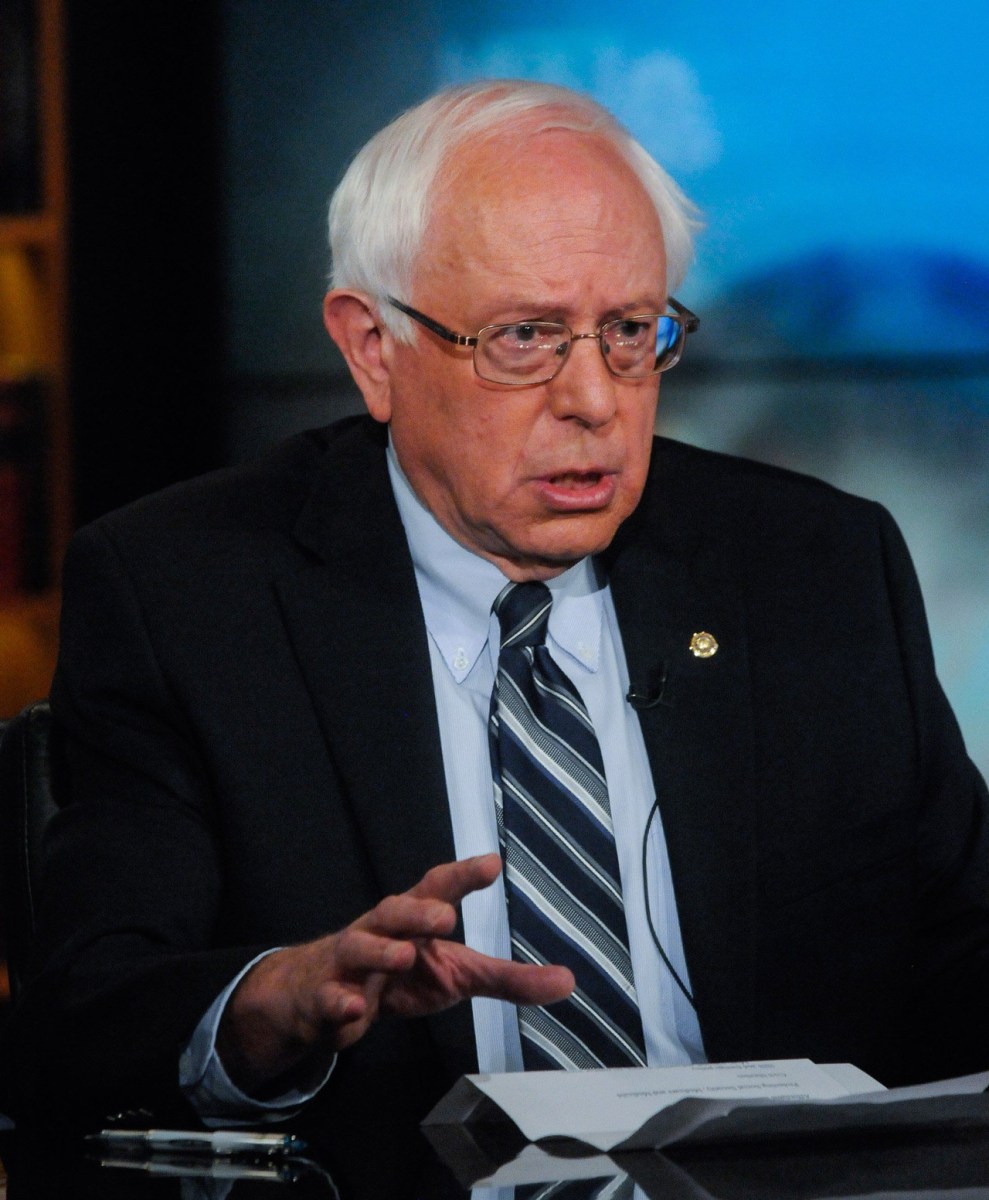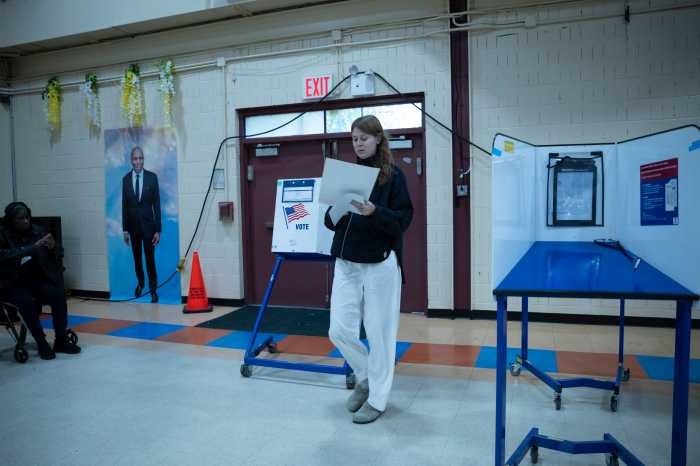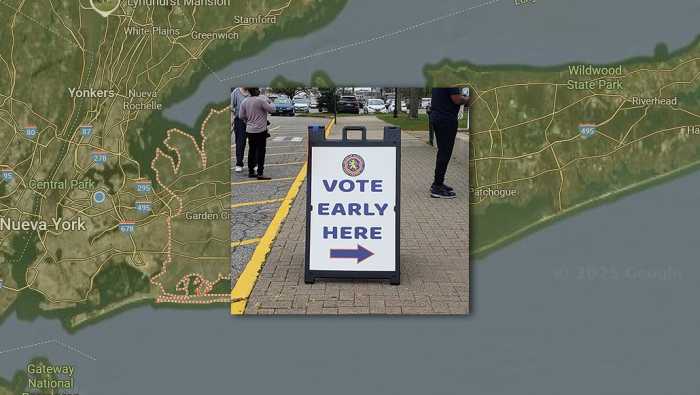As she sat by the counter with a smartphone to her ear and a website on her tablet generating a list of phone numbers, Eileen Gruber couldn’t help but think of her union-organizing father.
“He taught me to be active, he taught me to give back,” the Greenlawn resident says in between making phone calls at 30-year-old Joe Tronolone’s house in Islip, where a handful of people have gathered to drum up support for the insurgent presidential campaign of U.S. Sen. Bernie Sanders (I-VT). “I want to show my kids the same thing.”
“I don’t like making phone calls,” she admits, “but I’m doing this.”
No one really likes cold-calling people who are about to sit down for dinner after a long day’s work, but Gruber and her fellow Sanders supporters, encouraged by recent poll numbers, are intent on helping out any way they can.
The last time Gruber was inspired to pick up a phone for a candidate was during then-Sen. Barack Obama’s historic run in 2008.
It was her daughter who initially encouraged her to explore Sanders’ positions. A little bit of research then turned into pro-Sanders posts on Facebook. Now she’s all-in as a volunteer.
For Gruber, it was Sanders’ plan to tackle soaring student loan interest rates that caught her eye.
Her 21-year-old daughter, who, ironically, is named Hilary—with one “L,” she reminds this reporter—recently graduated college and is holding down two jobs in order to pay off thousands of dollars in crushing student loan debt.
“My big fear,” Gruber says, “is I’ve got two kids, and I’m afraid they’re not going to have what I have.” Gruber says her daughter wants to be an art therapist, and Hilary won’t be compensated with a six-figure salary.
“She wants to help people,” Gruber says. “People like that should be encouraged, not discouraged.”
Thus, her support for the plucky Vermont senator.
Sanders, an independent who is running for the Democratic presidential nomination, has emerged as a real threat to presumptive nominee Hillary Clinton’s bid. The self-proclaimed—and unapologetic—”Democratic socialist” has no problem attracting tens of thousands to his high-energy appearances as his anti-establishment, take-money-out-of-politics crusade continues to resonate with a segment of the American public fed up with Citizens United, the controversial 2010 US Supreme Court decision that gave rise to Super PACs—independent political groups that can donate heavily and anonymously to political campaigns.
“This great nation, and its government, belong to all of the people, and not to a handful of billionaires,” Sanders said in his campaign kickoff in May.
Sanders, the 74-year-old Brooklyn-born civil rights activist-turned-politician who eschews a teleprompter, hit his stride during the summer months, forcing Clinton to finally weigh in on issues fancied by progressive Democrats, such as the Keystone XL Pipeline, which she now says she opposes.
Clinton currently trails Sanders in New Hampshire and Iowa polling, and her once-considerable lead nationally has taken a hit, though she still holds a double-digit lead, according to various surveys. In the last quarter Sanders raised $26 million through mostly small individual donations, compared to the $28 million Clinton accumulated through her vast fundraising network. Sanders is fond of saying he doesn’t accept Super PAC money, a not-so-veiled shot at his main Democratic competitor and the robust field of Republican hopefuls who, in some cases, have raked in tens of millions from the likes of the Koch brothers and other deep-pocketed donors. (The $28 million figure does not include how much pro-Clinton Super PACs have raised for her.)
With a year to go before the 2016 election, many mainstream Democrats remain convinced that Sanders won’t win the nomination, let alone the White House.
“I do not believe that America’s voters are prepared to elect a socialist as president of the United States,” says Jay Jacobs, Nassau County Democratic chairman.
Sanders’ race may be more sustainable than seasoned political observers envisioned. Last week, for example, his campaign announced that it had reached its goal of getting one million individual donations at a quicker pace than both of Obama’s presidential campaigns in 2008 and 2012.
Much of the credit for his successful first five months on the campaign trail goes to an army of grassroots volunteers who are essentially working for free on the ground and on the Internet. Inspired by his populist ideas, scores of people have taken to social media sites like Facebook and Reddit, the go-to place for young, politically minded people, to broadcast comical memes, Sanders-related articles and commentary. Meanwhile, talented computer programmers are creating stylish websites to coherently explain Sanders’ stance on issues like income inequality, mass incarceration, immigration and civil rights, while also designing flyers that can be handed out in mass. And this is all done with little or no collaboration with the official Sanders campaign.
These are also trying times for Clinton’s campaign, which has had to divert important resources to respond to incessant queries about a private server that stored government emails during her time as the nation’s chief diplomat. The former Secretary of State’s campaign is also on a mission to make their candidate more “likable” by having her appear on popular shows that could highlight other sides of her personality like this season’s premiere of Saturday Night Live, and The Tonight Show Starring Jimmy Fallon, as well as on Lena Dunham’s new website.
“Politicians generally are not viewed as trustworthy,” says Jacobs, current member of the Democratic National Committee and the former head of the New York Democratic State Committee, who was critical of the mainstream media’s response to Clinton’s perceived email scandal. “I know her and I’ve been with her a number of times personally and privately, and I see who she is and the type of person she is, and that very often hasn’t come across.”
Sanders, at least for now, doesn’t have a “likability” problem. In fact, his supporters on Long Island—ranging from concerned parents to college students and disgruntled voters—believe he’s as authentic as any career politician can be.
“He’s not this smooth-talking guy,” says Tronolone, sitting in his Islip living room buzzing with Sanders’ supporters. “He’s an angry guy waving his arms around but people really like what he has to say.”
It’s people like him and Gruber who are stepping up to the plate to sell Sanders to skeptical observers.
Feelin’ the Bern
After a few minutes of instructions—and bites of spaghetti slathered in olive oil and minced garlic—the volunteers get down to business.
Tronolone takes the couch. Gruber finds a seat at a small counter in the kitchen and launches a browser that takes her to the site where she can access numbers to call. Larae Beale of East Meadow decides to make calls from a staircase leading to the second floor. Frank Imburgio of Dix Hills finds a spot at the dining table, which is filled with snacks and a delightful looking flatbread.
It’s not a conventional call center, but it’ll do. After all, Sanders’ grassroots pursuit of the Democratic nomination has been nothing if not eccentric.
At about 7:30 p.m., Gruber finally gets someone to bite.
“I was a registered independent, too,” she tells the man on the other end of the phone after her initial pitch, “probably for similar reasons as you, and I changed my registration because I really like [Sanders’] positions on income inequality and on college tuition.”
She directs him to appropriate websites with information on changing party affiliation.
“Thank you very much!” says Gruber, reminding him again about the Oct. 9 deadline. “That’s a week-and-a-half. Very important. Okay? Thank you!”
She celebrates by punching the air with her left hand and smiles.
“It matters to me,” Gruber says, looking around the room at the work she and the other volunteers are doing. “It matters to me a lot.”
Watching the scene unfold from across the dining room table is Imburgio, who says he first became mobilized at the beginning of summer, just around the time Sanders’ officially launched his campaign.
“Everything he has said I’ve always agreed with,” says Imburgio.
“The biggest thing by far is corporate funding, and Citizens United specifically,” he says, listing issues he’s concerned about. “The one percent not paying their fare share of taxes, corporate loopholes.”
Those gathered at Tronolone’s didn’t know one another prior to volunteering for Sanders’ campaign. Along with other LI Sanders supporters, they hand out pro-Sanders flyers at supermarkets and railroad stations, and communicate online through social media sites or a program called Slack, which reminds many users of AOL’s dial-up-era chat-rooms. Although the volunteers range in age from 25 to mid-50s, they have found common ground politically.
Tronolone hopes to one day see an end to corporate financing of elections. Sanders has said that if elected he’d only nominate Supreme Court justices willing to overturn Citizens United. But there’s so much more Tronolone says needs to be done.
“Income inequality is another thing, especially living here on Long Island,” he says from his couch. “You can see there’s some town where’s there’s unimaginable money and it’s like, ‘Oh my God, I can’t believe people live here in these houses,’ and then there’s places where it’s overrun with poverty.
“We’re unsustainable right now environmentally, economically,” Tronolone adds. “We’re headed toward a lot of catastrophes, and I feel that he’s the only one who’s really willing to take things on, to turn things around.”

Tronolone was among hundreds who went to Sanders’ New York City fundraiser at The Town Hall on Sept. 18. The Long Island contingent also included 34-year-old Sandra Garay Avila, who works for a medical billing company. She’s been following Sanders for about two years, she says.
Avila estimates that she’s spent about $400 of her own money to contribute to the campaign, whether its been through donations or the cost of printing flyers. She recently put in an order for 10,000 flyers aimed at appealing to Hispanic voters.
“It feels good at the end of the day when I do it,” she says, “because it is something that most of us are passionate about.”
Avila is worried about the future because of what she fears are similarities between this country and her family’s native El Salvador. About three decades ago, her parents’ home country was being run by just about a dozen families who combined owned 70 percent of the farm land, she says.
“When I look at this country now, I see it headed in the same direction, and it scares me because this is my country now, and this is the country my kids are going to live in and my grandkids,” Avila says.
Sanders’ brand of politics is also appealing to students on college campuses.
Michael Liuzzi, a 25-year-old Master’s student at Stony Brook University studying computer science, is not surprised at all with how well Sanders has performed up until now.
Liuzzi is a member of a Facebook group called “SBU Seawolves For Sanders.” Its members often gather on campus and encourage people to vote—whatever their political persuasion may be. Of course, they want people to vote for Sanders.
Liuzzi says the Internet has played a major role in organizing volunteer efforts.
“Bernie’s campaign is hyper technology-literate,” he says. “That’s sort of where he’s dominating in terms of organizing right now because he doesn’t have a big ground presence.”
“He’s getting a lot of people to do a lot of things for him for free,” Liuzzi adds. “And we love it.”
With awareness of Sanders’ campaigning growing, he has also opened himself up to more scrutiny. In July, Sanders and former Maryland Governor Martin O’Malley, who is also running for the Democratic nomination, attended a Netroots Nation town hall-style meeting and were repeatedly interrupted by members of the Black Lives Matters movement who wanted to hear detailed answers on how they’d address racial issues.
“Black lives, of course, matter,” Sanders reportedly said. “I spent 50 years of my life fighting for civil rights and dignity, but if you don’t want me to be here, that’s O.K. I don’t want to out-scream people.”
Sanders’ campaign has recently been accused of squashing dissent when pro-Palestine activists carrying signs that borrowed a popular Sanders’ campaign phrase—“Will ya feel the Bern 4 Palestine??!”—were told to drop the signs or leave.
“We received a warm welcome from all surrounding Bernie supporters and rally participants, many of whom also were carrying signs,” the group, Boston Students for Justice in Palestine, wrote on Facebook. “Within minutes of arriving, we were approached by police and venue staff, and told that the Bernie Sanders’ campaign team asks that we take down our sign. To our knowledge, nobody else who were carrying signs were asked to do the same.”
A campaign spokesperson said in a statement to The Intercept that “what happened was a poor decision by a low-level staffer and doesn’t reflect campaign policy.”
There’s also the matter of gun control, one issue in which Clinton appears more eager than Sanders to tackle directly. The issue was once again brought to the fore when a gunman opened fire inside a community college in rural Oregon, killing nine people. In a speech in New Hampshire on Monday, Clinton called for universal background checks and said, if elected, she’d take action with or without Congress’ help.
Sanders’ own record on guns could prove problematic considering his progressive label. When he served in the House of Representatives, Sanders voted against the Brady Handgun Violence Protection Act, which passed anyway. Sanders’ take on guns may be shaped by the state he represents.
Vermont boasts nearly 1 million acres of federal and public land that’s open to hunting, according to the Vermont Fish & Wildlife Department’s website, which notes: “Hunting is a way of life here.” Sanders’ campaign released a statement Monday in which the senator called for a ban on semi-automatic assault weapons, closing the gun show loophole and a better-enforced instant background check system.
The first Democratic debate is scheduled for Oct. 13, to be broadcast from Nevada on CNN. It may give voters a clearer understanding of each candidate’s position. Despite his rising popularity in the early primary states, Sanders isn’t as well-known nationally as Clinton, who previously served as the country’s First Lady when Bill Clinton was presdient and later as a U.S. Senator in New York before becoming Secretary of State under President Obama, so he needs a strong performance to endear him to more Americans.
None of the Sanders’ supporters interviewed for this story were fervently anti-Clinton, but they said their passion for Sanders would make it difficult for them to vote for Clinton if the 67-year-old Democrat eventually gets the nod.
“I don’t know,’ says Gruber when asked how’d she vote if Clinton were on the Democratic ticket for president. “I think Bernie is going to get the nomination, to be honest with you. I really believe it. I think that the party base, the people who really do vote and care is not as conservative as everybody believes that we are.”
“I don’t think people hate Hillary,” says Liuzzi. “I think that they think she’ll do some of what needs to get done. I just think they think Bernie is a better choice.”
“Bernie gets by on his own strengths,” he adds, “without having to point out any of her glaring weaknesses.”

































